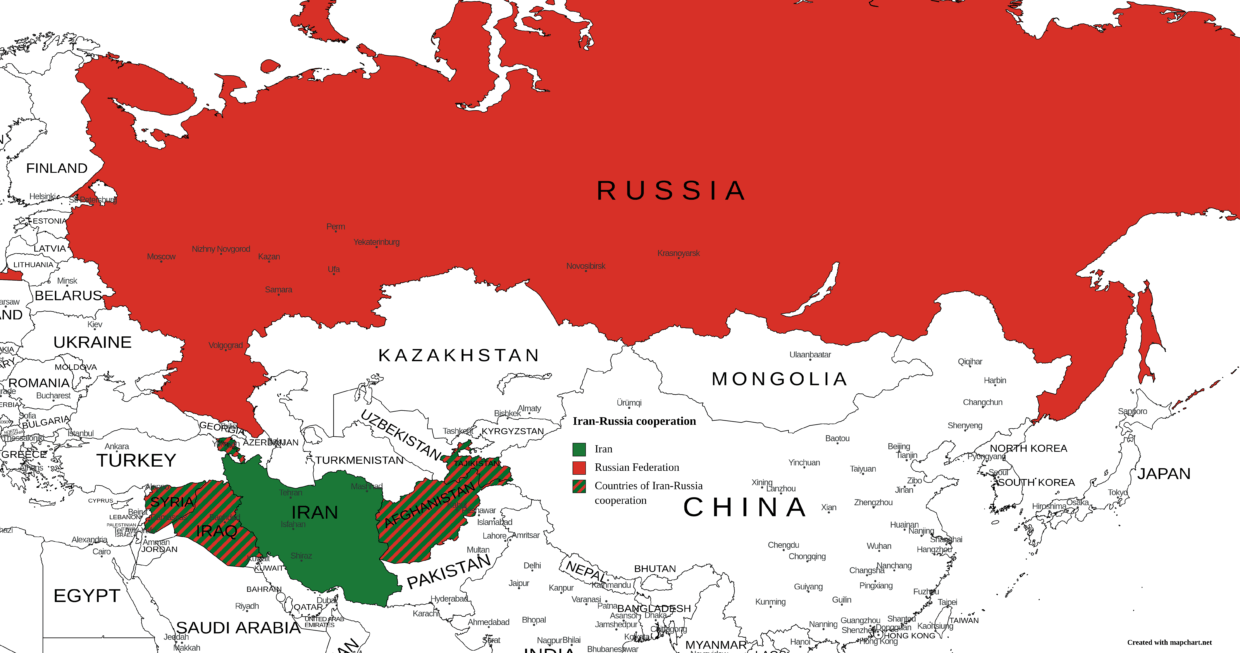
Geopolitical Report 2785-2598 Volume 12 Issue 4
Author: Silvia Boltuc
The meeting between the Iranian Foreign Affairs Minister Amir Abdollahian and his Russian counterpart Sergey Lavrov highlights that Iran seeks to strengthen its cooperation with Russia to support its new foreign policy based on regional cooperation and commercial trade.
As reported in previous monitoring articles, the Islamic Republic of Iran promotes safe corridors and stability in the target areas to support its import-export activities. Furthermore, Tehran interprets the collaboration with crucial Eurasian players such as the Russian Federation to counter Turkmenistan, Uzbekistan, and Pakistan’s attempt to cut Iran off regional trade routes (How Afghanistan is influencing the Turkmenistan-Uzbekistan cooperation). In this context, Iran is looking into regional politics to stabilise its position in strategic areas as Iraq, Afghanistan, and the South Caucasus.
On October 5th, 2021, Iranian Foreign Minister Amir Abdollahian flew to Moscow to meet with Russian Foreign Minister Sergei Lavrov and discuss regional security and stability. According to Abdollahian, Iran expects that Russia will be more involved in regional dynamics and react rapidly against any attempt to change the borders and the territorial sovereignty of the Eurasian countries (i.e., the recent Azerbaijani military conquest of part of the Nagorno-Karabakh or the Turkish annexation of Syrian regions along Ankara’s borders). In addition, the Minister’s visit aimed to intensify the cooperation between the two countries, which had convergent political intentions in the last months and had been marked by continuous consultations.
Iran hopes that Moscow will actively deal with terrorist attacks against its nuclear plants (Tehran accused Israel of conducting military operations against its nuclear facilities). Recently, the country contested the legitimacy of the U.S. sanctions and the excessive Western demands in the negotiations for the JCPOA. Furthermore, Tehran questioned the modus operandi of the International Atomic Energy Agency (IAEA).
Since the attacks against Iran have killed several nuclear scientists, Tehran has underlined that IAEA should assist member states with spreading knowledge and transferring technologies and equipment and also condemn all attacks against nuclear plants of the organisation members. Additionally, the Iranian authorities have perceived IAEA immobility and its request to replace the cameras’ memory cards in the Iranian nuclear facilities as an attempt to interfere and politicise the Iranian nuclear program.
Before the meeting, Abdollahian said that the two parts would have empathically discussed the current situation in the South Caucasus and Afghanistan.
Meanwhile, Afghanistan is waiting for the fourth batch of humanitarian aid from the Islamic Republic of Iran, the Deputy Head of the Taliban in Herat, Molavi Shirahmad Ammar Mohajer, met with the local authorities of the Iranian province of Razavi Khorasan, including the police chief of the border town of Taybad. Ammar Mohajer assured Tehran that the Taliban will never allow foreign people or groups such as the Islamic State to operate on Afghan soil against Iran during the meeting. Nonetheless, Afghanistan remains a serious question mark for Iran, which had worked together with the previous Afghan government to weave trade relations that included using the two countries as a common corridor for goods passing from India to Central Asia up to Russia.
Conclusion
The recent change in Kabul governance due to the rise of the Taliban and the possible close partnership among Afghanistan, Pakistan, Turkmenistan, and Uzbekistan risks undermining the Iranian efforts to become a key regional player and exploit a possible role of a regional transit corridor to contrast the effect of the Western sanctions. After the U.S. troops’ withdrawal and the Taliban’s rise to power in Afghanistan, the regional scenario has changed. Iran risks being no longer indispensable for the Afghan supply chain and, therefore, for Indian import-export.
Furthermore, Tehran might even lose the exemptions from U.S. sanctions that Washington adopted to support the Afghan and Indian economies. In this context, even though Iran has achieved some positive results, such as joining the Shanghai Cooperation Organisation (SCO), the new geopolitical scenario in Eurasia might consistently and negatively affect the Iranian economy and national interests. Therefore, Tehran seeks closer cooperation with Moscow in Afghanistan, South Caucasus, and Central Asia to counter the other regional players.
Since regional cooperation and trade are vital points in Tehran’s foreign policy, the new Iranian leadership aims at establishing safe corridors and good relations with its neighbour countries (Iran e Kirghizistan discutono la cooperazione regionale; Iran interests in Eurasian Economic Union: possibilities and constraints). Among possible partners is Iraq, a country where the Islamic Republic of Iran increased its export by 28% in the first half of 2021 despite the competition from China and Turkey and the presence of anti-revolutionary units in Iraqi Kurdistan. Iranian Foreign Ministry spokesman Saeed Khatibzadeh called on the Kurdish and Iraqi governments to disarm these groups, firmly declaring that Tehran will no longer tolerate terrorist attacks.
Currently, Iran is focusing on growing exports from the non-oil sector and stabilising the neighbour bordering countries to ensure safe corridors for its trade and safeguard its security. Iran is cut off from a possible partnership with Western countries due to the pending JCPOA, so Tehran considers Russia a key player in its regional strategy.
In this framework, it is possible to interpret the latest words of the Iranian Minister of Industry, Mines, and Trade, Reza Fatemi Amin, during the opening ceremony of the Iranian pavilion at Expo 2020 in Dubai when he stressed that Tehran had created 17 projects to remove export barriers, diversify its import-export markets, and create new jobs.
